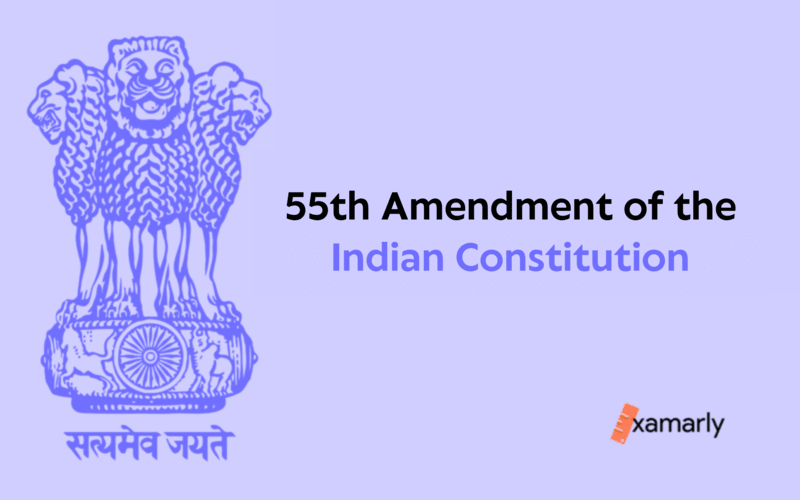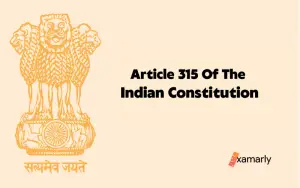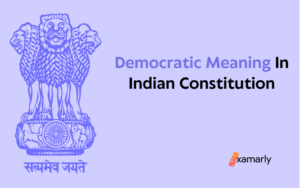The 55th Amendment of the Indian Constitution is also known as the Constitution (Fifty-fifth Amendment) Act, 1986.
Under this act, Article 371H was added to the Indian Constitution. Following this, Arunachal Pradesh was given the constitutional status of a State. It became the 24th State of the Indian Union.
55th Amendment of Indian Constitution: Emergence of Arunachal Pradesh as a State
The 55th Amendment of the Indian Constitution was enacted in the Thirty-seventh Year of the Republic of India by the Parliament.
It is officially referred to as the Constitution (Fifty-fifth Amendment) Act, 1986. The amendment objective was the insertion of Article 371H into the Constitution of India.
According to it, the Governor was to be bestowed with special powers after the establishment of Arunachal Pradesh as a State in the Union of India.
Salient Features and Facts
The Central Government has the authority to appoint the date on which the Act shall come into force.
It can do so by the means of a notification in the Official Gazette. Article 371H, which provides special provisions, must follow Article 371G in the Constitution of India.
The Constitution (Fifty-fifth Amendment) Bill, 1986 carried the Statement of Objects and Reasons. Eventually, this was enacted as The Constitution (Fifty-fifth Amendment) Act, 1986.
See Also – 56th Amendment Of Indian Constitution
Date Enacted
The 55th Amendment of the Indian Constitution was enacted on February 20, 1987.
Statement of Objects and Reasons
The decision to conferment of Statehood to the Union territory of Arunachal Pradesh was taken by the Government of India.
The Statement of Objects and Reasons was attached to the amendment bill. The main propositions have been listed below.
(i) The Governor of the proposed new State shall be in charge of the law and order in the State.
This is done keeping in mind the sensitive location of the place. Under the special responsibility rendered upon the Governor, while taking decisions and in the discharge of his duties in that place, he shall consult the Council of Ministers.
After the consultation, he may make an individual decision based on his judgment to determine the action to be taken.
If the President judges so, they may terminate this special responsibility of the Governor by issuing an order.
(ii) The number of members that would constitute the Legislative Assembly of the newly formed State of Arunachal Pradesh must be forty.
However, it is proposed that the provisional Legislative Assembly for the new State of Arunachal Pradesh will be formed by the existing Legislative Assembly of the Union territory of Arunachal Pradesh which is composed of thirty members.
This is to be maintained until the five-year term of the existing Assembly comes to an end and elections are held thereafter.
It is further proposed that there must be at least thirty members in the Legislative Assembly of the new State of Arunachal Pradesh.
The above-mentioned proposals can come into effect by making special provisions in the Constitution.
To fulfil the constitutional provisions mentioned above, the Constitution must be modified. For the formation of a new State, a distinct Bill also being introduced. This Bill is relatable to Article 2.
Important Provisions in the 55th Amendment of the Indian Constitution
Some important provisions are contained in Article 371H of the Indian Constitution. This article holds several provisions in favour of Arunachal Pradesh. They have been listed below:
(a) The Governor of the State of Arunachal Pradesh is to be endowed with a special responsibility.
He must ensure that law and order are maintained within the state. In case of discharge of his functions of that place, the Governor shall consult the Council of Ministers.
After the consultation, the Governor can decide the action to be taken based on his judgment individually.
Provided that if any question is raised on the matter of the exercise of his judgment taken individually under this clause, the decision made by the Governor at his discretion shall be treated as the final decision.
The rationality of the action taken by the Governor shall not be questioned. His decision shall not be subjected to what he shall have done or not done based on his judgment.
It further provides that in the case of receipt of a report from the Governor or otherwise, the President has the authority to decide that the law and order in the State of Arunachal Pradesh shall no longer necessarily be the special responsibility of the Governor.
In addition to that, the President shall issue an order with a specific date to cease the responsibility of the Governor with effect from that date.
(b) The Legislative Assembly of the state shall comprise a minimum of thirty members.
Summing Up
Constitutional amendments played an important role in changing the status of Union territories to that of Statehood in the Indian Union.
The 55th Amendment of the Indian Constitution introduced Article 371H into the Constitution of India.
Article 371H contained adequate provisions for the newly designated State of Arunachal Pradesh.
Being located at a sensitive spot, it is the fundamental duty of the concerned government to ensure the special protection of the societies, the people, and their rights.
It can be achieved through the aid of government support. The Legislative powers along with the duties of the Governor, Council of Ministers, the authority of the President, etc. would help in the protection and maintenance of law and order.
This would ensure that cooperative societies thrive in the newly formed State of Arunachal Pradesh, despite being geographically in a sensitive zone.
FAQs
Which Union territory gained Statehood after the 55th Amendment of the Indian Constitution?
Arunachal Pradesh gained the constitutional status of a new State of the Indian Union. Previously, it was recognized as a Union territory of the Indian Union.
Which article was added to the Constitution of India as the 55th Amendment of the Indian Constitution?
The 55th Amendment of the Indian Constitution saw the insertion of Article 371H into the Constitution of India.
What is Article 371H about?
According to Article 371H, after the establishment of Arunachal Pradesh as a State of the Union of India special powers are to be given to the Governor to maintain law and order in the region.
Where is Arunachal Pradesh located?
Arunachal Pradesh is a state located in the northeastern part of India, bordering Assam and Nagaland to the south, Myanmar to the east, Bhutan to the west, and China to the north.
What is the capital of Arunachal Pradesh?
The capital of Arunachal Pradesh is Itanagar.






